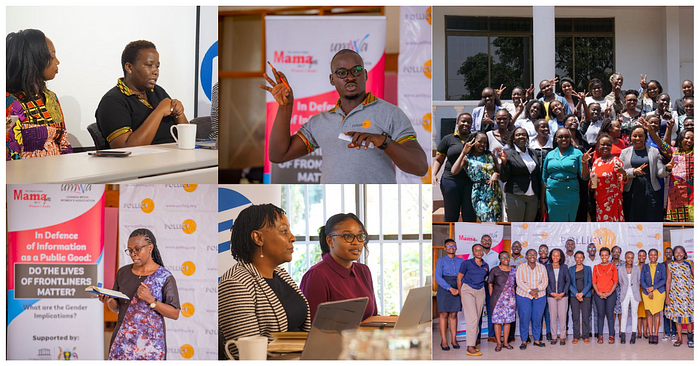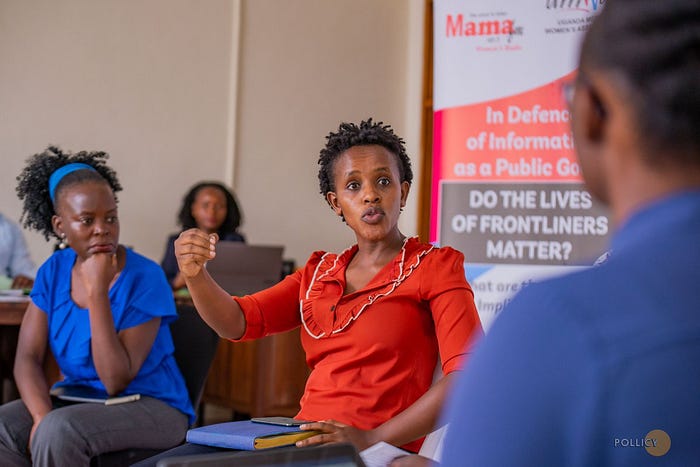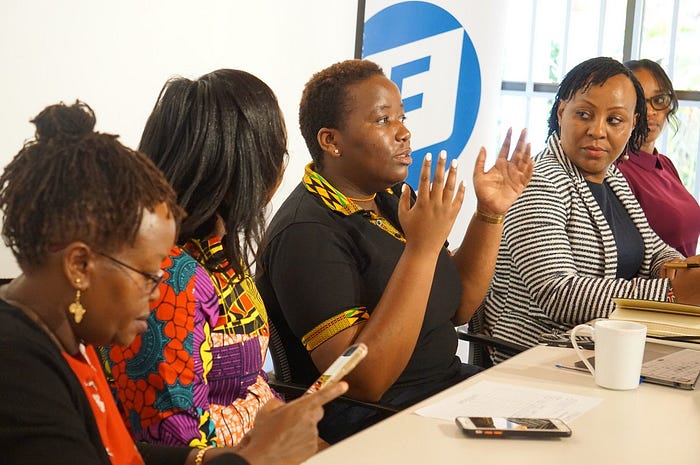Breaking the Chains: Women Journalists’ Fight Against Online Gender Based Violence

As the world becomes increasingly connected, the internet has opened up new opportunities for women journalists to voice their opinions and share their stories. However, it has also created new challenges, particularly in the form of online gender-based violence. Online attacks, harassment, and hate speech are not just a hindrance to the growth of women journalists but also a threat to their safety and well-being.
The International Safer Internet Day (#SID2023), celebrated every February 7th, brings together various organisations and individuals to raise awareness about online safety. This year, Pollicy co-organized the celebrations in Kampala, Uganda, with the Uganda Women Journalists Association, and in Nairobi, Kenya, in partnership with the Association of Media Women in Kenya and The International Association of Women in Radio and Television (IAWRT) Kenya.
A day before (February 6th), a Twitter space was organised by partners on the same discussing how women journalists are leading the charge for safe and inclusive internet. The events provided a platform for women journalists to share their experiences, challenges, and the importance of a safer internet for them.

Despite the challenges and threats faced by women journalists, events like International Safer Internet Day provide hope for a safer and more inclusive online space. The celebrations organised by Pollicy and its partners in Uganda and Kenya, as well as the Twitter space discussion, highlighted the important role that women journalists play in advocating for online safety and the need for more action to address online gender-based violence. Agather Atuhaire’s experience is just one example of why it is essential to continue these conversations and work towards creating a safer online environment for all voices, especially those of women journalists.
Agather Atuhaire made headlines in May 2022 when she broke the news on her Twitter account that the Parliament of Uganda had spent a whopping Shs. 2.8 billion to purchase two luxury vehicles for the Speaker and the Deputy Speaker. Her revelation and more, sparked public outrage, particularly since it came at a time when there was a marked increase in the cost of living due to rising prices of commodities, and people were being urged to be frugal by the Parliament leadership. This marked the start of Atuhaire’s never-ending troubles with people in power.
“When writing online, it’s important to remember that a section of people on the internet may no longer view it as just you doing your job as a citizen, but as a chance to attack, especially for women journalists,” mentioned Agather while speaking at the International Safer Internet Day celebration in Kampala.
Like Agather, many (if not all) women journalists face numerous challenges online, including online gender-based violence, which is closely linked to gender-based violence in the real world. They are often attacked due to their gender rather than the issues they raise. Sensitive issues that often go unheeded by those in power can be a risk to cover, and female journalists face far too many insensitive remarks directed at them.
“As a country, we must cultivate a culture of focusing on issues rather than individuals. Attacks on women journalists are often driven by their gender rather than the issues they raise, which is a significant concern,” mentioned Jan Agwang during the celebrations.
In Kenya, the call against online gender-based violence against women journalists has become the new norm. Trolling, doxing, body shaming, threats, non-consensual distribution of intimate images, and online sexual abuse are among the major reported types of online violence.
As a result, many women journalists relinquish their jobs prematurely, leading to few women in newsrooms and, more so at decision-making tables in the media.
During Safer Internet Day celebrations in Kenya, Irene Mwendwa, the Director of Strategic Initiatives at Pollicy, emphasised the need for women and girls to be at the forefront when discussing online safety as, in most cases, they are the victims.

“Safer Internet Day has evolved into a significant event in the realm of online safety over the years. It is important to note that when discussing internet safety, women and girls must always be at the forefront.”
Irene added that to effect change and engage better with the government and media; policies are needed; hence there is room to write stories on technology and its advancement in women’s and girls’ lives. There is room for journalists to write about technology.
Patience Nyange, a former gubernatorial candidate in Taita Taveta and also Executive Director of AMWIK, accented the need to equip women with the required skills to embrace digital spaces without fear. We must ensure our women have the requisite skills to reap the benefits of digital connectivity. She also noted the power of digital networking and the need to belong to professional associations that fully support and offer training such as digital safety and security, especially for women journalists.
To keep the internet safe, awareness, training, and teamwork should be taken momentously. Janet Machuka, while speaking at the celebrations in Kenya, mentioned that media organisations must prioritise the safety and well-being of their women employees by offering continuous online safety training and providing resources to support them in case of online attacks.
Machuka also acknowledged the benefits of the internet and assured many opportunities that have emerged. “Digital space gives you a chance to stand on your own. Be the right person! Many people are benefiting and brands are looking for people to manage their websites and social media. Everyone should take advantage of the international days for advocacy”.
Cecilia Maundu, a broadcast journalist and also the host of the Digital Dada Podcast, added that the media industry can work to raise awareness about online gender-based violence and the impact it has on women journalists. She also emphasised supporting each other in the digital spaces Digital is supporting each other. In her explanations Cecilia insisted that women journalists need to put out articles and stories that show online violence is happening. She also added that women journalists need to support each other when violence occurs to any of their colleagues.

As a panelist during the Kenyan celebrations, Grace Githaiga CEO, KICTANet and a Digital Trainer encouraged women journalists to embrace digital spaces and use the various tools it comes with to amplify their voices as well as create opportunities. “ The internet has vastly been used to help women navigate through their careers and provide opportunities to them”.The Internet is a very useful space for women in media.
This, however, cannot be achieved if in-house media houses’ policies are not implemented. Media houses need to revise current policies and implement provisions that address online harassment and abuse and hold the perpetrators accountable.
Furthermore, the society at large can support women journalists by promoting ethical online behaviour and speaking out against online harassment and abuse. By working together, we can create a safer online environment for women journalists to do their work without fear of attack or abuse. Safer Internet for Women Journalists.
Written by Ibrahim Waiswa Batambuze, Navina Mutabazi and Irene Mwendwa for Pollicy.
